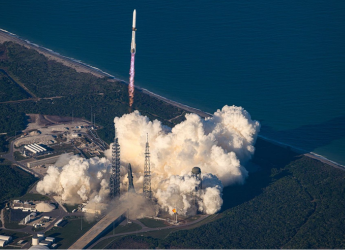- Home
- Science
- Science News
- New Study Uncovers Discrepancies in Universe’s Expansion Rate, Challenges Cosmology Models
New Study Uncovers Discrepancies in Universe’s Expansion Rate, Challenges Cosmology Models
Study shows conflicting expansion rates in the universe, raising doubts on cosmology.

Photo Credit: Pixabay/WikiImages
Discrepancies in the universe's expansion rate challenge cosmological models
Recent findings have intensified debates surrounding the universe's expansion, suggesting discrepancies in its speed may challenge long-standing cosmological models. Observations from advanced instruments like the Hubble Space Telescope and James Webb Space Telescope indicate variations in the rate of expansion across different regions, leaving scientists searching for explanations. Researchers have now strengthened the evidence for this inconsistency, hinting at potential gaps in the understanding of physics and cosmology that have guided theories for decades.
Study Reveals Contradictory Measurements
According to findings published in The Astrophysical Journal Letters, data collected from the Dark Energy Spectroscopic Instrument (DESI) has provided new insights into the Hubble constant, the measure of the universe's expansion rate. Using the Coma galaxy cluster, located roughly 320 million light-years from Earth, the study determined an expansion rate of 76.5 kilometers per second per megaparsec (km/s/Mpc). This conflicts with earlier measurements based on the cosmic microwave background (CMB), which suggested a lower value of 67 km/s/Mpc.
Clashing Methods Deepen the Puzzle
The discrepancy arises from two primary methods of calculating the Hubble constant. Early-universe data derived from the CMB aligns with predictions from the standard cosmological model. In contrast, readings from Cepheid variable stars and Type Ia supernovae — utilised to measure distances in later cosmic stages — consistently yield higher expansion rates. Efforts by teams such as DESI aim to refine these measurements further but continue to amplify the tension.
Experts Call for New Theories
As reported by Live Science, Professor Dan Scolnic of Duke University, the study's lead author, remarked that the results challenge fundamental assumptions about the universe's structure. He said that this is not just a matter of resolving a difference; it suggests that our cosmological models might need reevaluation.
As studies progress, scientists remain focused on identifying errors or gaps in existing methods, while others explore entirely new frameworks for understanding the universe's evolution.
Get your daily dose of tech news, reviews, and insights, in under 80 characters on Gadgets 360 Turbo. Connect with fellow tech lovers on our Forum. Follow us on X, Facebook, WhatsApp, Threads and Google News for instant updates. Catch all the action on our YouTube channel.
- Samsung Galaxy Unpacked 2026
- iPhone 17 Pro Max
- ChatGPT
- iOS 26
- Laptop Under 50000
- Smartwatch Under 10000
- Apple Vision Pro
- Oneplus 12
- OnePlus Nord CE 3 Lite 5G
- iPhone 13
- Xiaomi 14 Pro
- Oppo Find N3
- Tecno Spark Go (2023)
- Realme V30
- Best Phones Under 25000
- Samsung Galaxy S24 Series
- Cryptocurrency
- iQoo 12
- Samsung Galaxy S24 Ultra
- Giottus
- Samsung Galaxy Z Flip 5
- Apple 'Scary Fast'
- Housefull 5
- GoPro Hero 12 Black Review
- Invincible Season 2
- JioGlass
- HD Ready TV
- Latest Mobile Phones
- Compare Phones
- Leica Leitzphone
- Samsung Galaxy S26+
- Samsung Galaxy S26 Ultra
- Samsung Galaxy S26
- iQOO 15R
- Realme P4 Lite
- Vivo V70
- Vivo V70 Elite
- Asus TUF Gaming A14 (2026)
- Asus ProArt GoPro Edition
- Huawei MatePad Mini
- Infinix Xpad 30E
- Huawei Watch GT Runner 2
- Amazfit Active 3 Premium
- Xiaomi QLED TV X Pro 75
- Haier H5E Series
- Asus ROG Ally
- Nintendo Switch Lite
- Haier 1.6 Ton 5 Star Inverter Split AC (HSU19G-MZAID5BN-INV)
- Haier 1.6 Ton 5 Star Inverter Split AC (HSU19G-MZAIM5BN-INV)












